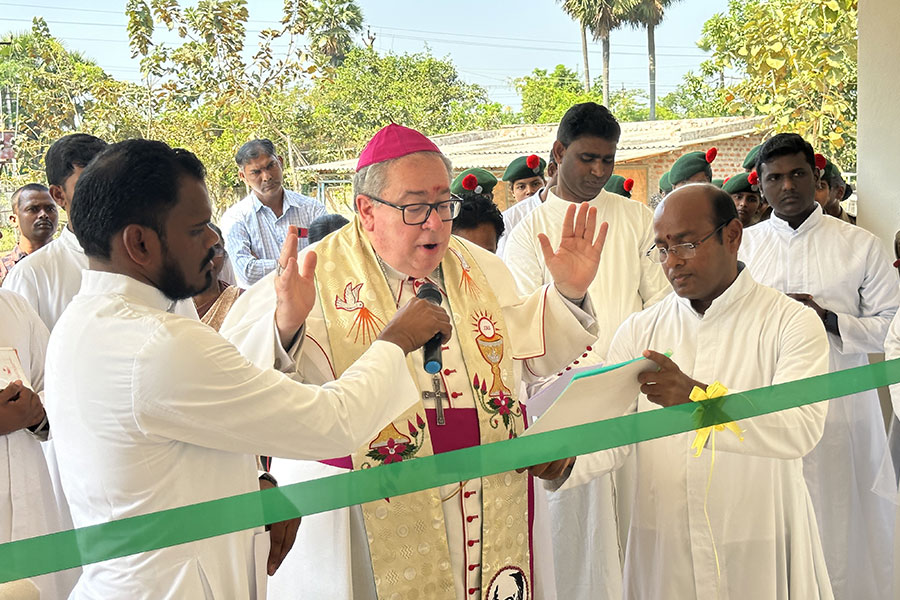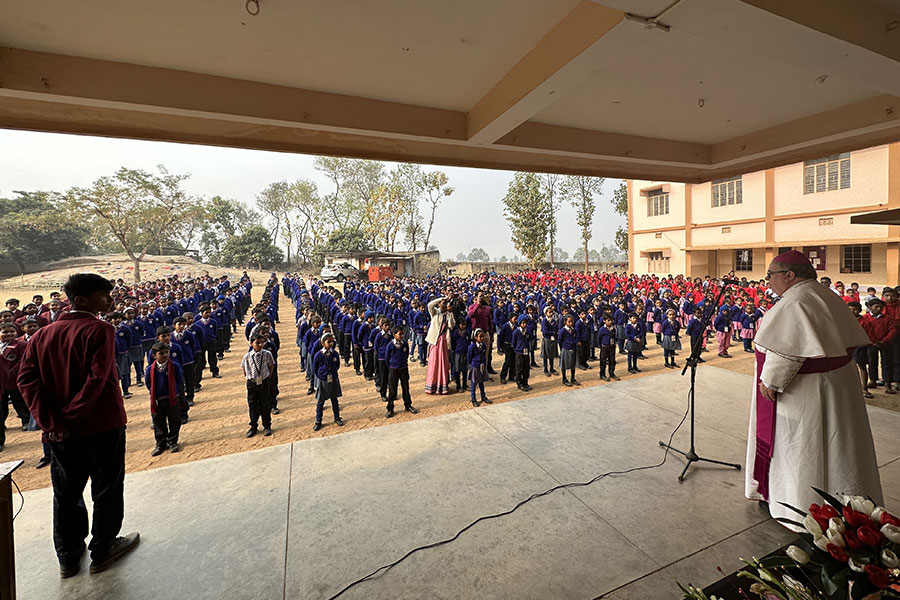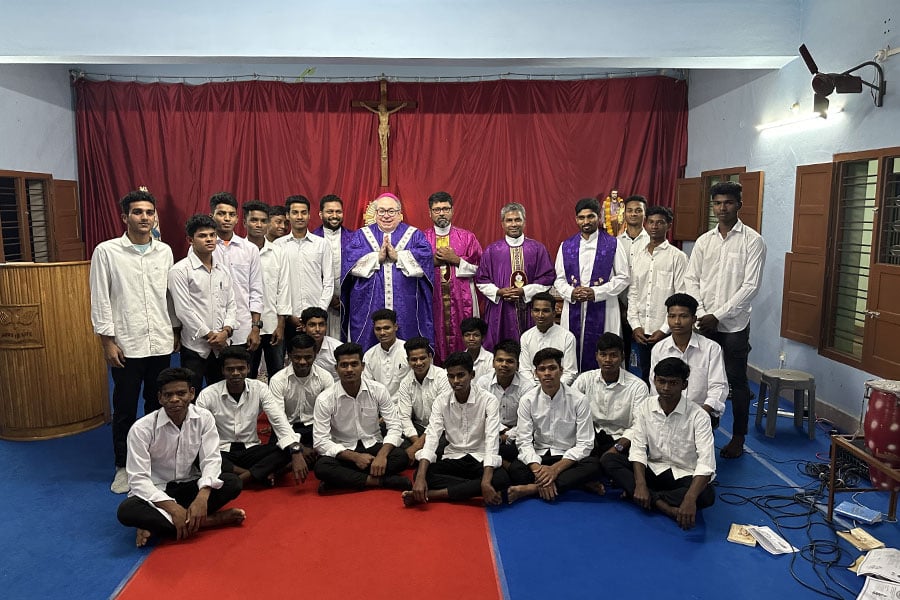Snapshots from India

In Calcutta, Sister Mary Joseph, Superior General of the Missionaries of Charity, welcomes Bishop Michael Olson.
Bishop Michael Olson and Father Thomas Jones, parochial vicar of St. Jude Parish in Mansfield, traveled to India for four weeks in February. The bishop sat down with the North Texas Catholic and discussed some observations from the visit.
North Texas Catholic: What was the purpose of this trip?
Bishop Michael Olson: I wanted to go to India to visit the superiors and the religious houses of formation that provide 22 of our priests here in the diocese: the religious orders of two provinces of the Third Order Regular Franciscans; the Heralds of the Good News; and finally, the two provinces and a region of the Pallottine Fathers.
NTC: Did it help you better understand our missionary priests from India?
Bishop: What’s been nice is visiting the seminaries that they attended, and seeing their graduation pictures on the wall and then taking a photo of it and sending it to them. Now I come back and visit with them, hear them tell stories about that experience, and also the experience of their assignments that they’ve had — very challenging assignments of founding a school in a predominantly non-Catholic area, a non-baptized, non-Christian area, for example. But they persevere in the faith by loving God and loving their neighbor. That same Spirit has brought them here.

I asked the superiors, “What are some of the criteria that you find important before you offer a priest to serve here?” And one replied, “Of course he has to be a good priest, well grounded in spirituality, seasoned, and experienced.” But then he said, “They also have to be willing to minister so far from home.”
Sometimes in a sense of hubris — the shadow side of our American pride — we think, “Who wouldn’t want to minister here?” But they’re 11 and a half hours ahead of us in the time zone; it took me 20 hours of travel time to get there. It’s a far, far place. And their willingness to come here, and to be of service, and to suffer sometimes uncharitable and impatient criticism — their willingness to do that for Christ should really embolden our souls to be more dedicated to Him as well.
NTC: After an extensive visit with those superiors and religious houses, how would you describe the state of the Catholic Church in India?
Bishop: Well, it’s very strong. It’s very small, but very effective. At its heart is evangelization primarily through education — educating the young — and then also outreach. Where those overlap in a particular way is the education of women.
NTC: What can the faithful in our diocese learn from our brothers and sisters in India?
Bishop: First of all, what is it like to really practice your faith — and that includes outreach, education, faith sharing, all of the things that we can take for granted here — amidst a hostile government. The current government in India is pushing a Hindu nationalism, that India is a Hindu country, and anything, particularly from the west, particularly Christianity, should be rejected or at the very least discouraged. For example, it’s illegal to make a convert to Catholicism in India.
Now it does happen, but the Church very wisely focuses on living their faith as a witness, and then also they take the long game of preparation and evangelization where so many of those whom they educate leave eventually for jobs, good jobs here in the United States, as well as in South Africa, and in Australia, and the United Kingdom. Many of them have had such a positive experience of the ministry of the Church that they’re drawn to conversion.
We can take from that a sense of being patient with faith. The Church in India dates to apostolic times — the Apostle Thomas brought the faith there, and I was privileged to celebrate Mass at the site of his martyrdom. The Indian experience of the Church and Christianity is not a product of colonialism, although it’s tried to be painted that way by the current nationalists.
Do not underestimate the power of outreach to the poor done with an evangelical heart, very simply because this is what Christ has asked us to do. Mother Teresa was always saying, “You don’t have to feed everybody or solve world hunger. Feed one person.”

The Lord asked her to be faithful, not successful. So focus on the fidelity of that, and I think that’s really at the heart of how we should live our faith in times of change, in times where ideologies that are very hostile to the Church and to human dignity are having a good deal of influence in our own nation.
NTC: What were some high points from your visit?
Bishop: First of all, it was wonderful to see some of the priests who’ve served here, who’ve returned to India. It was very nice to have that reunion, to renew old friendships and fraternities.
Secondly, to speak and visit and listen to seminarians who are preparing for priestly life and particularly missionary life.
Thirdly, it was also good to meet some of the family members of some of the priests who are serving here, and to thank them personally for supporting their sons and brothers in their ministry and their missionary ministry. It’s important for us, especially those of us who are native to North Texas, or even born in other parts of the U.S., to really have a sense of gratitude and appreciation of how far these good priests have come to minister and serve as missionaries and as priests.
It’s a good time to say thank you to them. Not just the Indian priests, but priests from other parts of the world who’ve come here.
One of the reasons I went was to foster a better sense of ecclesial unity and communion. The Church is a lot more closely united than we may think sometimes.
We have to begin with the unity that we find in Christ, the unity of our baptism, the unity of our human nature, the unity of the basic things that make us flourish.
The sense of challenges that the Church in India faces were very educational for me — the challenges that bishops face, but also people in family life face.
If we’re focused on Christ and what He’s given us and the gift of the Eucharist and all of the sacraments that really enliven our family life, then we have an understanding based in gratitude that can transcend and help us persevere through very difficult, challenging times.
NTC: In pictures you shared, you received a tremendous welcome everywhere.
Bishop: Yes, we were welcomed a lot. “Hearty welcome” seems to be the Indian expression.
That’s a very strong custom shared in all of the states of India and all of the languages of India. You welcome a guest with veiling, kind of showing God surrounding them, the warmth of the sense of welcome. While it’s ritualized, it’s not simply perfunctory. It’s very important for them to offer that welcome and for one to receive that welcome.
NTC: Which might be difficult?
Bishop: Everything was new for me in a sense, and so I wanted to remain open. But I thought, you enter into sort of a deeper sense of the mystery of the human person in a new place like that. And I was very grateful for that type of welcome because it is far away and everything is different. But that sense of a warm welcome really helps an outsider, before asking, “Why are you here?” or, “Are you here in the right way?” It is an important lesson for us in Christian hospitality, which has been part of the Church since the apostolic times.
Today with the challenges we face at our border, which are very complicated, because we do have a national security issue, and at the same time we have a responsibility to welcome the stranger, provide for their basic needs, for no matter how long they’re here. To welcome them as another human being.
That’s the stance that we’re trying to take as a Church through our outreach in a sense: to work with our government to see what are the principle issues of security that we can assist with, but also just simply basic kindness to people. Jesus is very clear on that when He tells us to welcome the stranger.

NTC: Has this trip given you new ideas or new insights?
Bishop: It’s helping us to form a presbyterate first, to work together and to share that common call and that common identity and mission as priests. It’s very important.
Secondly, the importance of education with evangelization. It’s a central component because it helps us understand the Gospel very clearly. Whenever Jesus came to town, first He healed, He cared for the poor, and He taught.
That really is the heart of a healthy church, a Church that’s not closed in on itself. And not preoccupied with small things that don’t have to divide us.
NTC: Any memories you want to share?
Bishop: A girl at St. Vincent Pallotti National English School asked me, “You come from the United States, which is a very developed nation, and we’re in India, which in many ways is not a developed nation. What can the United States learn from India? And what can India learn from the United States?”
I said, “One of the things we can learn in the United States is there’s a natural religiosity to the people in India.” There’s a natural openness to God, which I think is human. The people have a natural respect for God, and they know God exists, in somewhat of a meaningful way. And I think that’s here too, though we don’t acknowledge it.
What the United States has is our discussions, even if there are different approaches and even if they can get someone angry or spirited, on how do you take care of the human person and who belongs?
In India there are challenges because in some areas the caste system is still very strong. Some people don’t matter; the Church is facing that. Also the particular role of women there is something the Church is facing very much. I marveled and I was gratefully impressed by a number of the religious orders of women and also by the whole church in a very important ministry: taking care of elderly women, who have no children, who have no surviving husband, or they’ve been left behind.
Another religious order, the Religious Sisters of the Good Shepherd, will take care of young girls who are abandoned, left in bus stations, trafficked. And so the sisters and their lay collaborators house them, educate them, teach them, and then prepare them for both the business world and then also for marriage. And then maintain that relationship afterwards. And particularly one of the sisters said, she said, “We teach them about their basic rights as human beings.”
The majority of people who are poor are overwhelmingly women because they fall through societies, and I think the Church has a place for them.
All photos are courtesy of Bishop Michael Olson. This interview was edited for brevity and clarity.
